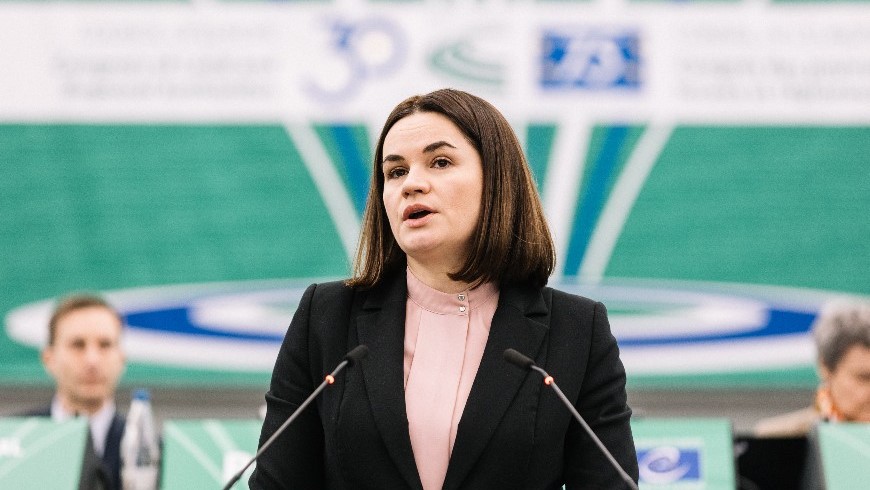The Congress has joined the initiative of the Council of Europe, which has already set up a contact group with the democratic forces and civil society of Belarus. As guest speaker at the plenary session on 27 March, Belarus democratic opposition representative Sviatlana Tsikhanouskaya called for solidarity from local and regional authorities in Europe, who are an important asset in the struggle for a democratic Belarus.
In response to the repression and muzzling of the opposition in the country following the uprising triggered by the disputed re-election of dictator Alexander Lukashenka in August 2020, a whole range of structures have been set up outside the country to fight against the authoritarian regime in power. For over three years, powerful networks of activists in exile in Vilnius, Kyiv, Warsaw and elsewhere in Europe have been calling on the international community to work together to build a democratic Belarus freed from the stranglehold of the Russian regime and the Lukashenka dictatorship.
Speaking at the plenary session of the Congress on 27 March, Sviatlana Tsikhanouskaya, representative of the Belarus democratic forces, painted a tragic picture of the regime’s repression of its opponents ever since her childhood: “We were brought up never to stick out from the crowd, and to be submissive. But since the uprising in 2020, the Belarus people have woken up. We have set up a self-organised government with responsible and courageous individuals whom the KGB has not managed to deter, in spite of violence and imprisonments. A crowdfunding system has enabled us to keep going, especially abroad where diaspora groups plead our people’s cause through people’s embassies in various countries on a daily basis. We have already drawn up a set of reforms and a new constitution to change our country as soon as a window of opportunity arises. Our aim is to build a democratic regime, a state genuinely governed by the rule of law, as a member of the European family, but we won’t be able to make the change as long as we have Russian soldiers’ boots on our territory and a dictator in power.”
The goal of joining the European Union is part of the agenda of the Belarus opposition, which claims to express the views of the country’s younger generation. The Belarus democratic forces regard the Council of Europe as the institution accompanying countries in their democratic transformation, which is why it sets such store by co-operating with its various bodies, in particular the Congress.
In her address, Sviatlana Tsikhanouskaya called for practical support from Congress members, who could help the Belarus democratic forces to prepare the reform of self-governance and local self-government.
The Belarus democratic opposition representative also proposed that the Congress launch a support programme for children of political prisoners and veterans who have fought side by side with Ukrainians since 2014, while also offering scholarships for young people to enable them to study and observe the democratic functioning of local and regional authorities in Europe. Lastly, she referred to the need to promote a broad coalition of countries to make the case for Belarus’ European integration with the European institutions.
The debate that followed Sviatlana Tsikhanouskaya’s address showed the commitment of Congress members, from Georgia to the United Kingdom, to providing practical assistance to Belarus’ democratic diaspora and civil society. “Your country hasn’t been forgotten!” said Gunther Bergmann (EPP/CCE), backing up his comments with an example because on 25 March his region of North-Rhine Westphalia had approved a programme to support Belarusians who had fled to Germany. Telling the story of a French citizen of Belarus origin, a sociologist at the University of Strasbourg who had been sentenced to prison by the Lukashenka regime for writing a dissertation condemning the dictatorship, Véronique Bertholle, Deputy Mayor of Strasbourg (SOC/G/PD), expressed the Strasbourg city council’s unwavering support for the Belarus diaspora.
At the close of the plenary session, Ms Tsikhanouskaya thanked the Congress and shared her feeling of being among friends who gave her encouragement to continue her democratic mission.
***




